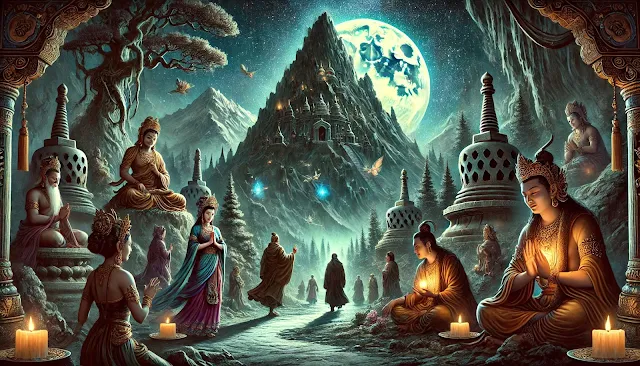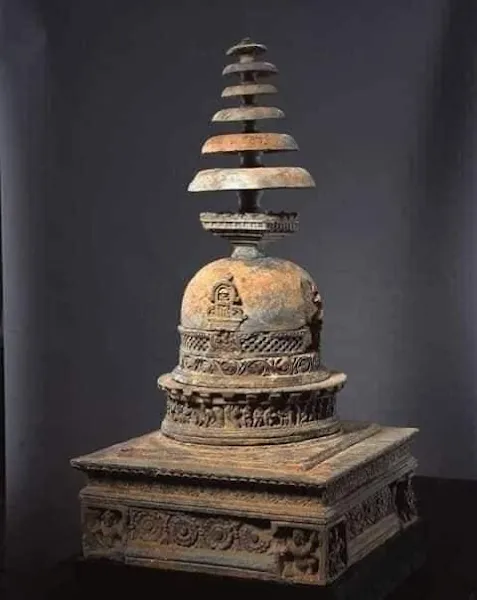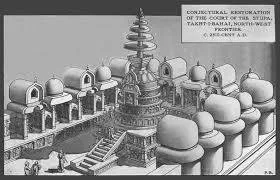We walked together, our steps light and purposeful, as he led me towards a mountain. At its base was a cave, dark and ancient, hidden within the mountain’s belly. I could sense the weight of history in the air, the kind that lingers in places long forgotten by the world.
At the top of the mountain, I could see the ruins of old stupas, though only their foundation blocks remained. The structures, once grand, had been eroded by time. Yet, their significance was still felt, as if they held a sacred power. Inside the cave, I was surprised to find a large gathering of people. Their eyes were fixed on me and something that glimmered softly in the dim light — relics. These were not just ordinary relics; they radiated with a presence that commanded reverence and awe.
But soon, the calmness in the cave began to break. People started arguing, their voices rising in heated tension. The air filled with hostility as they debated which nation had the right to claim ownership of the relics. It was as if ancient rivalries had been reignited, and their desire for power and control overshadowed the sanctity of the space. Just as the conflict was about to erupt into violence, the monk raised his hand and spoke. His voice was like a bell ringing through the cave, silencing the chaos.
"All of you," he said, "do you even know the moto and principal of these relics?" His question cut through the room like a sharp blade. Everyone stood still, listening intently. "If anyone here tries to step forward in greed or claim ownership, they will pay the price. A hand raised to take what does not belong will be cut off. A foot stepping where it should not tread will be severed. This is the law — the code of preservation and protection.
The guardianship of these relics is not to be challenged."
The weight of his words hung heavy in the air. The crowd seemed to shrink under the warning, understanding the severity of their actions. Suddenly, a princess approached me, her face anxious yet determined. She took hold of my hands and, with urgency in her voice, said, "We have official communication between you and our people. I must be first in priority. Do not forget this." Her request was clear — she sought to secure her place in line, to ensure that her nation’s interests were recognized above all others.
As I pondered her words, the monk gently reminded me of my purpose. "There are others waiting for you inside the cave," he said. "You must meet them. This is your first meeting, and they have awaited your arrival for a long time." He guided me further into the cave’s depths, where the light grew dimmer, but the sense of mystery and anticipation deepened.
As I stepped into a deeper chamber, I was greeted by an unexpected sight — a Yakkhā, a fierce guardian spirit, appeared before me, his form both menacing and majestic. He showed me his face, as if to mark our encounter, then vanished as quickly as he had appeared.
Following him came another guardian spirit, an ārakkha devatā, who materialized to acknowledge my presence and the significance of my journey.
Finally, a young man appeared. His face was familiar, yet distant, as if from a time long ago. He greeted me warmly, though it was clear this was our first official meeting. There was an air of recognition between us, as if we had been connected for many years, perhaps even from a time when I was still very young.
This meeting had been long awaited, and now it was finally taking place.
Before I could speak, the monk’s voice echoed in my mind. "This is a warning," he said. "The guardians are watching, and the preservation process is in place. If anyone violates the sanctity of these relics, the standard operating procedures will be activated immediately. There will be no hesitation, and the consequences will be swift."
I woke from the dream, the monk’s words still resonating within me. It was not just a message for me, but a warning to all — a reminder that sacred things must be protected, and those who seek to disrupt their preservation will face dire consequences. The relics, the cave, the guardians — they were all part of a larger force that existed beyond our understanding, a force that would not be compromised.



























